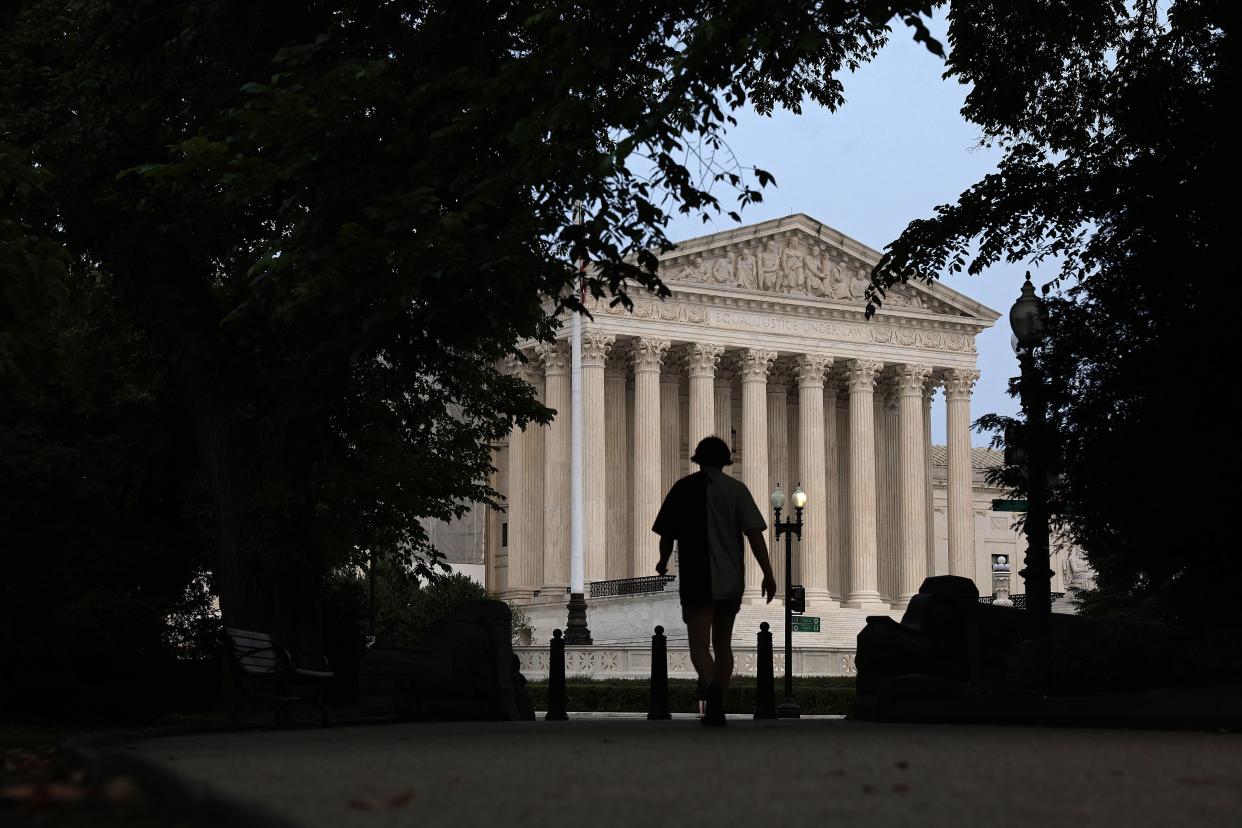U.S. Supreme Court case sheds light on Georgia Public Service Commission voting lawsuit

- Oops!Something went wrong.Please try again later.
Editor's note: This story was updated to correct the spelling of Shelia Edward's name, include District 2 libertarian candidate Colin McKinney.
A voting rights lawsuit from Alabama that made its way up to the U.S. Supreme Court might impact your Georgia Power bills in the near future.
Georgians have received news on Georgia Power price increases and the ever-nearing operation of Plant Vogtle's two new reactors, but there has been little news on the delayed election of the state's energy utility regulatory board, the Public Service Commission (PSC), which oversees electricity and gas prices in Georgia.
Voters were supposed to vote on two of the five PSC seats in November, but the election was delayed pending a Voting Rights Act lawsuit alleging the at-large voting system used to elect PSC members unlawfully dilutes the Black vote in Georgia.
However, that case might be decided soon since the U.S. Supreme Court released its decision on a case with similar facts in Alabama on June 8.
On the ruling: Supreme Court rejects Alabama congressional map that diluted Black vote in surprise ruling
Last election season: Public Service Commission election delayed again per Supreme Court ruling
What's the argument?
In 2020, plaintiffs including leaders of groups such as the NAACP, Georgia Conservation Voters and Black Voters Matter filed a Voting Rights Act lawsuit against Georgia Secretary of State Brad Raffensperger.
Until this case, the at-large system has meant that although PSC candidates must live in their districts, they are elected by voters of the entire state. The state has contended that the PSC commissioners, who serve six-year terms on the board, be voted on at large because they vote on matters that affect the entire state.
Waiting: Public Service Commission elections in limbo while court decides fate; rate hike still on table
PSC decisions: Public Service Commission approves Georgia Power bill increase for ratepayers in 2023
Racial bias, regardless of intent, is the question
"The Voting Rights Act seeks to prevent racial bias in voting even in absence of racial intent," said Alicia Hughes, who is a visiting assistant professor of practice and interim director of the Center for Civil Rights and Social Justice at Emory University School of Law.
She said even if a policy does not intend to cause inequality, if the outcome is proven to produce racial bias or inequity it is in violation of the Voting Rights Act of 1965. The case that spurred the act came from Alabama in the 1960s, where even though Black Americans had the right to vote, intimidation and other tactics prevented Black voters from casting their ballots.
Hughes said in this case decided last week, Allen v. Milligan (formerly Merrill v. Milligan), the court was considering whether the congressional districts in Alabama were drawn in a way that watered down Black Alabamians' votes. Currently, only one out of the state's seven districts is majority Black even though the last census reflected that a little over 26% of the voting population is Black.
The highly anticipated decision was a 5-4 split, with Chief Justice John Roberts and Justice Brett Kavanaugh siding with the court's more liberal-leaning justices in favor of redrawing the congressional districts.
Hughes said that in Georgia, the PSC election lawsuit argues that the at-large election dilutes the Black vote. Although the district the plaintiffs live in has a higher proportion of Black residents than the state average, the statewide vote doesn't reflect that.
"But if you say we're electing these commissioners based on congressional districts, we see that there's diversity based on the congressional district that reflects the population of the voters," Hughes said. She said this is seen in all other elections in Georgia and the PSC should come into alignment.
In the 144-year history of the PSC only one Black candidate has ever won a seat, Democrat David Burgess who won his election in 2000 after initially being appointed to the position. Currently, all five seats of the commission are Republican. Fitz Johnson, a Black man, currently sits on the board for District 3 but was appointed to fill a vacancy, not elected, and is seeking to retain his seat in the upcoming election.

Hurry up and wait
According to Hughes, Georgians will be in a "hurry up and wait" holding pattern until the PSC election case is decided, but it could be soon. Had the election taken place before this decision, she said it could have caused the results to be nullified, thus waiting has allowed the state ensure the election is conducted fairly in accordance to law.
Right now, the case is at the 11th District Court of Appeals, which last held a hearing on the case in December. The case was stayed, pending the Supreme Court's decision on Allen v. Milligan. With that case now decided, Georgia's case can proceed.
The attorney representing the plaintiffs in the PSC election case, Bryan Sells, said his team is still analyzing the Supreme Court decision to determine how it will impact Georgia's case, but that the Alabama decision is good news for those who care about equal voting rights nationwide.
The District 2 and 3 seats are up for re-election. In District 2, incumbent Tim Echols (R) is running against Patty Durand (D) and Colin McKinney (Libertarian). In District 3, incumbent Fitz Johnson (R) is running against Shelia Edwards (D).
Marisa Mecke is an environmental journalist. She can be reached at mmecke@gannett.com or 912-328-4411.
This article originally appeared on Savannah Morning News: Alabama Supreme Court case impacts Georgia Public Service Commission

